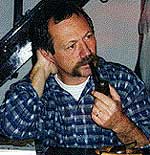José Bové milks 250 sheep in the Larzac region of France, a rocky, windswept place where you would think no farmer could produce anything. But Bové turns sheep milk into one of the gastronomical treasures of the world, Roquefort cheese. Bové is a leader of the local Roquefort producers association and of the second largest farmers organization in France. So he was well-known locally before he and nine friends drove their tractors to the nearby town of Millau last year and pulled down an under-construction McDonald’s restaurant. Now he is well-known globally.

Sheep up or sheep out.
Bové’s beef with McDonald’s began with America’s beef industry, particularly its habit of dosing feedlot cattle with the kinds of hormones that athletes are tempted to use for the same reason — to bulk up fast. Europeans are disinclined to eat this high-test meat. The European Union forbids hormone-raised beef, either domestically produced or imported. That makes the American beef industry, and the government officials to whom the beef industry pays large campaign donations, very angry.
Now that we have a World Trade Organization, we have an official way to resolve such conflicts. WTO resolutions nearly always come out in favor of trade, no matter what its social or environmental or cultural or health consequences. It was no surprise when the WTO declared the EU ban on hormone-raised beef illegal.

José Bové — he’s cheesed off.
The EU refused to lift the ban. So the WTO imposed the only punishment within its power. It allowed the U.S. to slap retaliatory tarriffs — high taxes imposed at the border — on French products. One of the products thus affected was Roquefort cheese. Which made José Bové and his Roquefort-producing friends very angry.
At a hearing on the actions of Bové and friends on June 30, at least 50,000 people jammed into Millau for a political demonstration equivalent in purpose to Seattle’s anti-WTO bash six months earlier. In the crowd’s estimation, if not the court’s, Bové is a hero. The T-shirt seen all over the streets said on the front, in a direct quote from Bové, “Le Monde n’est pas une marchandise.” (The world is not merchandise, not a product, not for sale.) On the back it said, “Moi non plus.” (Me neither.)
Bové’s supporters are by no means only French. The American media tend to frame stories like this as a confrontation between French and U.S. farmers. But some American farmers actually donated to help with Bové’s legal expenses. The comments of one farmer: “A few of us were standing around our co-op this morning wishing we had some way to help those French guys, and now we have your email we’re glad to send some money so we can have some small part in this.”

Don’t have a cow, man.
The Millau Ten were found guilty — they readily admitted that they pulled down the McDonald’s. They are free until their sentences are announced in September. Because Bové has a prior record of struggles against the French military and against genetically engineered crops, he faces months in prison.
Bové’s home hamlet of Montredon is tiny; maybe six or seven families live there. You would expect its Wednesday evening farmers market to be a small affair. In fact hundreds of people typically show up to shop for vegetables, fruit, preserves, cheese, meat, wine, ceramics, and leather goods. José and a couple of other guys fire up a barbecue where everyone brings meat to grill. They sit around eating and drinking, and then the music starts. There’s a small play. It’s not possible to distinguish producers from consumers; many folks are both. This is a community.

Arch-nemesis.
Somehow, over centuries, people have learned not only to make a living in the sparse Larzac, but to make a rich life. José Bové chose a brilliantly symbolic act to compare the quality of that life with the antiseptic arrogance of McDonald’s. He was protesting more than the injustice of taxing French sheep farmers to force European consumers to accept U.S. mass-produced beef. He was protesting the whole idea that has come to be called globalization.
In a culture dominated by the bare logic of market exchange, everything becomes commodified, including our time, our intelligence, our landscape, our water, our food. José and his neighbors are saying no, that’s not what we want. No, we refuse to be sucked into that system. We insist that our value to one another and the value of our land and lives not be measured in dollars or francs. We insist that the World Trade Organization not be granted the power to force us to eat food from factories. We insist that community, culture, taste, work, and nature are more important than cheap food or free trade. We insist on protecting our traditions from the narrow, heartless economics that would have us fill our lives with things produced wherever they can be made most “efficiently.”

